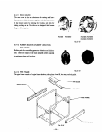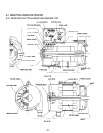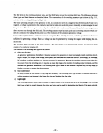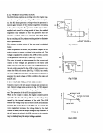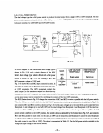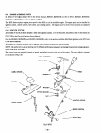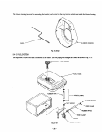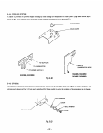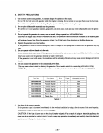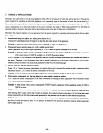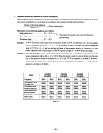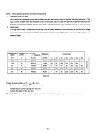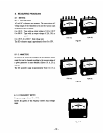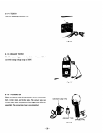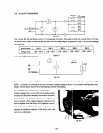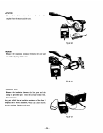
6. SAFETY PRECAUTIONS
1. Use extreme caution near gasoline. A constant danger of explosion or fw exists.
Do not ffi the fuel tank with gasoline while the engine is running. Do not smoke or use open flame near the fuel tank.
Be careful not to spill fuel when refueling. If spilt, wipe it and let dry before starting the engine.
2. Do not place inflammable materials near the generator.
Be careful not to put gasoline, matches, gunpowder, oil cloth, straw, trash and any other inflammables near the genera-
tor.
3. Do not operate the generator in a room, cave or tunnel. Always operate in a well-ventilated area.
Otherwise the engine may become overheated and also, the poisonous carbon monoxide contained in the exhaust gases
will endanger human lives. Keep the generator at least 1 m (4 feet) away from structures or facilities during use.
4. Operate the generator on a level surface.
If the generator is tilted or moved during use, there is a danger of fuel spillage and a chance that the generator may tip
over.
5. Do not operate with wet hands or in the rain.
Severe electric shock may occur. If the generator is moistened by rain or snow, wipe it and fully dry it before starting.
Don’t pour water over the generator directly or wash it with water.
If the generator is wet with water, the insulations wilI be adversely affected and may cause current leakage and electric
shock.
6. Do not connect the generator to the commercial power lines.
This may cause a short-circuit or destroy the generator. Use a transfer switch for connecting with indoor wiring.
NOTE:
The parts numbers of the transfer swidches and of the plastic box to store tiem are as shown in Table 6- 1.
I
1
Part No.
I
Part Name 1 my Phase 1
Allowable Current
!
36545604 08 ; Transfer Switch 1 1
! 1 1 15A
367 45605 06 ! 1
I
Transfer Switch 1
; 1 : 30A
340 45606 08 ; Transfer Switch 1 1
i 1 60A
340 45608 08 ) Transfer Switch ! 1
( 3 ; 15A
34845609 08 1
I
Transfer Switch 1 1
3 I ! 30A
367 43008 08 / Plastic 80x : 1
1.3 j 30A
34843009 08 1 Plastic 80x 1 1
1 I 60A
Table 6- 1
7.
Use fuses of the correct capacity.
If the generator rpm is increased exorbitantly in the overload condition by using a fuse in excess of the rated capacity,
the generator could be burnt and the AVR be damaged.
CAUSTION: if the fuse is burnt out or the circuit breaker tripped off as a result of using an electrical appliance, the
cause can be an overload or a short-circuit. In such a case, stop operation immediaeiy and carefully check the electrical
appliance and ACplugs for faulty wiring,
- 28 -



